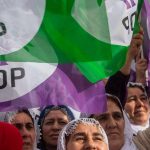By Ali Abaday
Being powerful has its struggles. When people become powerful, they may not know if they’re doing the right thing or whether that power will become toxic. Particularly if they’re part of a strong group, their attitudes and actions towards minorities will seem quite normal and correct.
In the United States during the civil rights movement, there was a great deal of violence toward Blacks as they struggled for equality. African Americans who fought for the right to vote, to ride the bus in the front rows with White people, and to eat at the same lunch counters faced vicious attacks. Some were even killed.

At that time, especially in the Southern states, Whites who killed African Americans escaped without punishment. Juries made up entirely of White people always acquitted White defendants. In their eyes, they were the true owners of the United States and the other races were meant to serve them.
Many student groups and civil rights activists fought for change, and eventually, they got what they wanted. In order to end future racist thinking, publications like comic books that catered to children also underwent a change. An example of this is the X-Men, a comic that was always focused on the struggle between good and evil, where the hero group was made up of mutants of different races who fought evil together.
In the same years, Marvel’s Fantastic Four series introduced Black Panther, the first African superhero. In the pages of comic books, real-life minorities who were fighting and dying for their rights ran alongside superheroes from adventure to adventure as an allegory for children to learn from.

These days in the US, it’s less common for someone to be discriminated against for the colour of their skin, but racism is still one of the biggest problems there. Still, African American superheroes are now taking a larger role in popular culture. The film Black Panther received six Oscar nominations, and on television, Black Lightning and his daughters are fighting bad guys together.
On TV, it’s even possible to see gay and trans heroes. Programmes for young people often deal with topics like not judging people for their sexuality or gender identity. Uhura and Captain Kirk’s taboo-breaking kiss on Star Trek marked a crucial turning point.

Superhero comic books aren’t just teaching children it’s wrong to discriminate against minorities or treat them badly. They also show that rights can be won only through hardship and self-sacrifice. One of the best graphic novels on this topic is the trilogy The March, about the life of civil rights activist and US Congressman John Lewis. In the book, Lewis’ past experiences are intertwined with President Obama’s swearing in and beginning his term, laying bare the enormity of their struggle. Books like these are also important for young African Americans so that they don’t forget how we reached this point.

When reading about John Lewis’ life and experiences, one can’t help but think of Kurdish people in Turkey. Although Turkey has never viewed itself as a racist country, there isn’t much of a difference between what happened in the US in the 1960s, especially in the South, and what’s happening now in Turkey’s Southeast.
Kurds have been persecuted for years in the name of fighting terrorism, which continues even today. A good number of MPs from the People’s Democratic Party (HDP), founded to protect Kurdish rights, are in jail now. The party’s former co-head Selahattin Demirtaş is in jail. It appears there is no political agent to solve Kurds’ problems.
There has never been a comic book about what Kurds have faced or what’s happened to their leaders. If only there were a comic book, like the one about John Lewis, that told the story of Leyla Zana, who was elected to Parliament but her oath of office, given in Kurdish, was rejected and she was removed from her seat. This would be a really good way to share her ordeals more widely.

It’s fundamentally important to address the issue of Leyla Zana. Her struggle, her experiences, her character, and her words are like a summation of everything that has happened to the Kurds, especially in the last 50 years.
There’s a certain group of people who would say this idea will just lead to terrorist propaganda. However, years of prejudice and stereotyping have made the Kurdish Workers’ Party (PKK) more powerful than Kurds’ political efforts. Those who really want to bring an end to the PKK, like Leyla Zana, Ahmet Türk, Selahattin Demirtaş, Selim Sadık, and Orhan Doğan, need to have their stories told.
It is one of Turkey’s greatest shortcomings that there is still no comic book about Leyla Zana. I’m sure that there are lots of children in the Southeast memorising her life story, but it’s important for everyone else in the country to learn about her, too.
Many people have forgotten about the problems created in the past, when Kurdish parents could not name their children as they pleased or when Kurdish children were forced to speak Turkish at school; many people aren’t aware of what police and military special forces did in Kurdish villages and how their actions only worsened the fear spread by the PKK in the region.
Who knows, maybe someday people will be able to speak openly about what happened to Leyla Zana and the Kurds. Solutions are possible, and stories will be told about Turkey’s unrecognised writers, activists, and politicians.
Source: Ahval News



